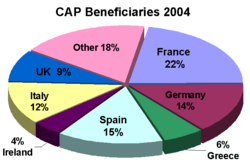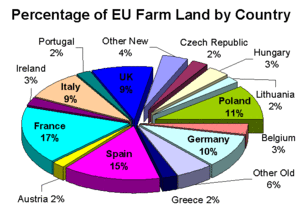UK rebate
The UK rebate (often referred to as the British rebate) is a rebate on the United Kingdom's contribution to the EU budget paid back to HM Government by the European Union.
History

The rebate was negotiated by British Prime Minister Margaret Thatcher in 1984. The main reason for the rebate was that a high proportion of the EU budget (at that time 80%, now approximately 41%)[1] is spent on the Common Agricultural Policy (or CAP), which benefits the UK much less than other countries as it has a relatively small farming sector as a proportion of GDP. Payments to the EU are largely funded by VAT returns and are roughly proportionate to the size of the economy. The rebate was also sanctioned because, at the time, the UK was the second poorest member of the ten European Economic Community members (now the European Union).[2]
The rebate is calculated as approximately two-thirds of the amount by which UK payments into the EU exceed EU expenditure returning to the UK. Currently the rebate is worth € 3.8 billion a year.[3] The UK remains one of the largest net contributors. The method of calculating the rebate is complex, but its effect is to increase contributions required from all other member states, to make up the loss from the overall budget. Germany, the Netherlands, Sweden and Austria all have their contribution to make up for the rebate capped to 25% of the figure which would otherwise apply, leaving France to make up for the main part of the increase in what Britain would pay without the rebate. Final calculations of the rebate are only made four years after the budget year in question.
Pressure for change
There has been growing pressure in recent years from various EU member states for the rebate to be scrapped. This is partly because the recent additional member states of the EU, which are considerably poorer than the fifteen pre-2004 states, will be a considerable expense on the CAP and the EU budget in general. The view is put forward by many that this makes the UK rebate harder to accommodate within the EU budget, leveraged with the moral argument that all the new entrants are substantially poorer than the UK. The new entrants, however, are likely to be net recipients of EU funds and not net contributors like the UK and only Germany will make a larger contribution to these poorer entrants.
The rebate distorts UK funding negotiations with the EU. Normally, countries and independent agencies within each country bid to receive central EU funds. The UK government is aware that two-thirds of any EU funding will in effect be deducted from the rebate and come out of UK government funds. Thus the UK has only a one-third incentive to apply for EU funds. Other countries, whose contributions into the budget are not affected by funds they receive back, have no incentive to moderate their requests for funds.
Furthermore, many EU grants are conditional on the recipient finding a proportion of funding from local sources, frequently national or local government. This increases the proportion coming from UK government revenue even further. This has the effect of artificially reducing EU expenditure returning to the UK and worsening the deficit which the rebate is intended to redress.

The British government has resisted campaigns to abolish the rebate and the UK has a veto on any decision by the EU to do so. Former Prime Minister Tony Blair said that he would veto any attempt to scrap the rebate. He was supported by many in his Cabinet and by the main opposition party, the Conservatives, as well as the majority of the British public.[4] Supporters of the rebate argue that the distortion created by the rebate is minor compared to that created by the Common Agricultural Policy, which is expensive and has implications for free and fair trade in the EU. In addition, they point out that without the rebate, the UK would pay much more into the EU than comparably wealthy countries like France, due to structural differences between their economies.
As of 2004, France gets more than twice as much CAP funds than the UK (22% of total funds compared to the UK's 9%) which in cash terms is a net benefit that France gets over and above what the UK gets from the CAP of €6.37bn.[5] In comparison, the UK budget rebate for 2005 is scheduled to be approx €5.5bn. Agricultural expenditure for new member states is included in the 'other' segment of the graph. This was limited in 2004 to 25% of payment rates applying to existing member states, rising to 30% in 2005 and 100% in 2013. Total CAP expenditure is capped, so in the absence of further changes, payments to all the pre-2004 member countries will fall by 5% over this period.[6] Some commentators claim that to a large extent, France gets twice the CAP payment received by the UK because it has twice the amount of farmland, although the extent to which there is a correlation between the two is disputed.[7][8]

A popular view in the UK is that if the UK rebate were reduced with no change to the CAP, then the UK would be paying money to keep an inefficient French farming sector in business – to many British people, such an injustice would be seen to be grossly unfair. However, this argument ignores that France remains a net payer to the EU budget.
If the rebate were removed without changes to the CAP then the UK would pay a larger net contribution than France. The UK would make a net contribution of approximately €10bn compared to the current contribution of €3.86bn, versus a current French net contribution of €6.46bn.[9] The UK has a slightly lower GDP than France,[10] its per capita is also lower. Germany has a GDP approximately 25% higher than either France or the UK, but per capita income is comparable to the other two countries. France technically makes a net contribution to the EU budget about twice that of the UK,[9] and is the greatest contributor towards the UK rebate, which means it would benefit most from its abolition. It should be noted however that if France were not required to contribute towards the rebate it would still contribute more to the EU budget than the UK.
These contrasting positions led to deadlock at the June 2005 EU budget negotiations in Brussels. France and other states demanded the abolition of the UK rebate at this meeting. Britain dismissed this as a diplomatic manoeuvre by France to save face after their rejection of the European Constitution in a referendum two weeks before the meeting. The UK made CAP reform a prerequisite of removal of the rebate, a proposal their opponents rejected. The negotiations thus ended without an agreement being reached. In December 2005 the UK Prime Minister Tony Blair agreed to give up approximately 20% of the rebate for the period 2007–2013, on condition that the funds did not contribute to CAP payments, were matched by contributions from other countries and were only for the new member states. Spending on the CAP remained fixed, as had previously been agreed. Overall, this reduced the proportion of the budget spent on the CAP. It was agreed that the European Commission should conduct a full review of all EU spending.[11][12]
See also
- Brexit
- Economy of the European Union
- Economy of the United Kingdom
- Sapir Report – a 2003 European Commission sponsored report recommending the transfer of EU expenditure toward wealth creation and cohesion, and away from the CAP.[13]
References
- ↑ "European Parliament EU Budget 2009 Press Release".
- ↑ Reuters (16 December 2005). "Reuters footage". ITN Source archive. Retrieved 26 January 2013.
Blair is under pressure to yield on the rebate won by his predecessor Margaret Thatcher in 1984 to reflect the fact that Britain, then the EU's second poorest member, benefited little from farm subsidies.
- ↑ "EU Budget 2012 Financial Report". European Commission. 14 December 2013. Retrieved 6 March 2014.
- ↑ "Press Releases: Open Europe responds to new EU budget proposal". Open Europe. 14 December 2005. Retrieved 20 October 2011.
- ↑ "Q&A: Common Agricultural Policy". BBC News. 20 November 2008. Retrieved 2010-05-26.
- ↑ "Q&A: The UK budget rebate". BBC News. 23 December 2005. Retrieved 2010-05-26.
- ↑ "Home". Irri.org. 2011-08-16. Retrieved 2013-10-18.
- ↑
- ↑ 9.0 9.1 Data from different standpoints (absolute, per capita, as proportion of GDP)
Nicolaus Heinen (11 May 2011). "EU net contributor or net recipient: Just a matter of your standpoint?" (PDF). Deutsche Bank Research. Retrieved 2011-12-31.
Explanation without the data tables: Nicolaus Heinen (18 May 2011). "EU net contributor or net recipient: Just a matter of your standpoint?" (PDF). Deutsche Bank Research. Retrieved 2011-12-15. - ↑ List of countries by GDP (nominal)
- ↑ "Key points of the EU budget deal". BBC News. 17 December 2005. Retrieved 2010-05-26.
- ↑ http://ue.eu.int/ueDocs/cms_Data/docs/pressData/en/misc/87677.pdf
- ↑ An Agenda for a Growing Europe – Making the EU Economic System Deliver